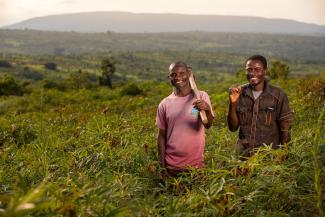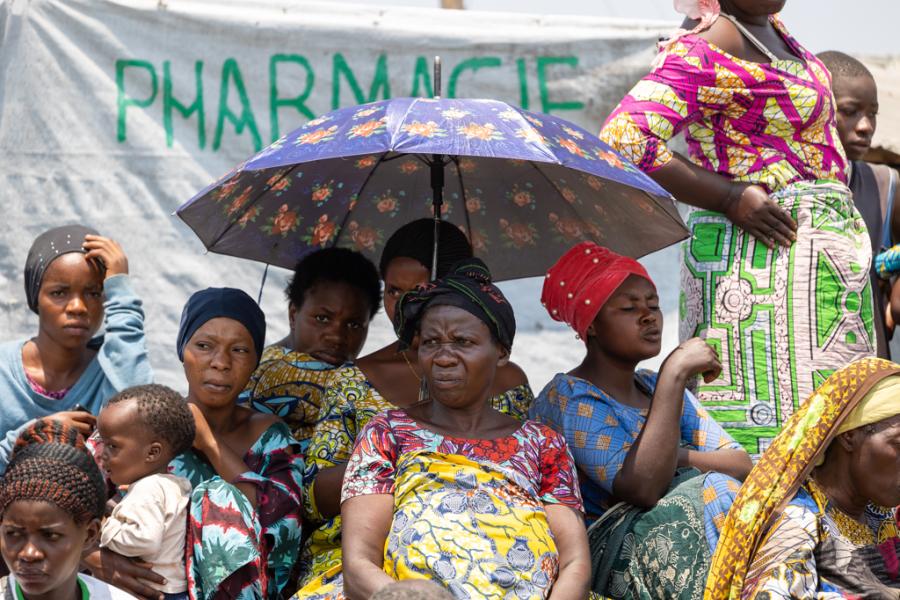2023 situation overview
The humanitarian emergency in the Democratic Republic of the Congo (DRC) is one of the most complex crises in the world. The challenges of the past three decades, which have included deadly confrontations between armed groups, rampant violence, frequent flooding, high-impact epidemics, acute food insecurity, and inadequate or absent basic infrastructure, have caused unprecedented levels of needs and forced millions to flee their homes. The situation only worsened in 2023 as conflict escalated in the eastern provinces of North Kivu, South Kivu and Ituri, with widespread human rights violations and an exponential rise in incidents of gender-based violence being particularly concerning. Traditionally safe areas of the country also saw an increase in instability.
As a result of this crisis, some 700,000 people were newly displaced within the DRC in 2023, taking the number of IDPs in the country to 6.2 million. Throughout the year, many families joined the over 1 million refugees and asylum-seekers from the DRC hosted in 22 countries across Africa. Around 54,000 people arrived in Burundi, Rwanda, Uganda and the United Republic of Tanzania. By the end of the year, those four countries were home to 760,000 refugees from the DRC. Moreover, in addition to displacing Congolese citizens, the widespread violence in the DRC also deeply affected the 526,500 refugees and asylum-seekers from Burundi, the Central African Republic, Rwanda and South Sudan in the country.
Within the DRC, the 2023 Humanitarian Response Plan (HRP) coordinated the delivery of assistance to 10 million people. The plan focused on saving lives, alleviating suffering, and improving the protection of civilians, while also supporting affected populations to meet their basic needs. UNHCR played a leadership role in the Protection, Camp Coordination and Camp Management, and Shelter clusters in the HRP. As part of a coordinated approach to respond to the needs of IDPs, UNHCR reached 13,600 IDPs with cash assistance, 2,600 with support to obtain civil status, identity or legal status documentation, and 9,000 with direct and indirect specialized gender-based violence services.
The response to the needs of refugees from the DRC was coordinated and implemented through the 2023 DRC Regional Refugee Response Plan (RRRP). While host governments steered the provision of protection, assistance and durable solutions to refugees, UNHCR led 69 RRRP partners in work that supported and complemented national and regional strategies, working closely with development actors, the private sector, and refugee-led organizations.
Under the RRRP, in Angola, Burundi, the Republic of the Congo, Rwanda, Uganda, the United Republic of Tanzania, and Zambia, 916,300 Congolese refugees and 584,600 host community members were reached with assistance.
RRRP partners’ support for basic services meant that 158,400 refugee children enrolled in primary education, 31,900 refugee children enrolled in secondary education and 16,330 were able to benefit from governmental social safety nets.
RRRP interventions contributed to durable solutions and self-reliance, with 25,829 refugees submitted for resettlement, 1,380 supported to voluntarily return to their own country, and 43,700 receiving livelihoods support. 600,000 vulnerable refugees received food assistance and 179,640 received core relief items.
These achievements were made despite the severe underfunding of the humanitarian response to the DRC situation. Only 32% of the $605 million required for the RRRP and 40% of the $2.25 billion required for the HRP were received by the end of the year. UNHCR received only 13% of its $310.9 million needs-based budget for the DRC situation response.
This lack of resources hampered UNHCR’s ability to provide protection and solutions to forcibly displaced people. The provision of all support beyond emergency referrals to secondary care was stopped in Rwanda. Vulnerable children’s education was impacted in Zambia due to the loss of support for school materials. And the support available to individuals with specific needs, survivors of gender-based violence and sexual exploitation and abuse, and at-risk children was drastically reduced in the United Republic of Tanzania. This compromised the health, well-being and future of refugees, with immediate and long-lasting repercussions.
Food cuts and lack of livelihood opportunities also increased the risks faced by an already vulnerable population. Refugees in Lôvua settlement, Angola, received only 75% of the food ration previously provided. Similarly, in Uganda, the reduction in food assistance caused the percentage of families with poor food consumption scores to rise from 11% to 21%.
This had a negative impact on refugees’ health and nutrition, especially among children, pregnant and lactating mothers, and older people. It also created concerns over refugee safety and dignity and, in some instances, led to onward movements of families in search of better conditions.
These challenges came in addition to high population growth rates, food insecurity, worsening socioeconomic conditions, epidemics, shocks related to the climate crisis, and supply chain constraints, which put substantial pressure on host countries in 2023 and led many refugees to resort to negative coping strategies and increased their vulnerability to exploitation and abuse.
The outlook for 2024 is concerning: increased political instability and the phased drawdown of the United Nations Organization Stabilization Mission in the DRC (MONUSCO) are likely to lead to further insecurity and internal displacement, negative repercussions on access to humanitarian actors, and more refugee flows to neighbouring countries in the coming years.
Financial overview
More contributions information on previous years: Funding Update 2022 | Funding Update 2021
A close friendship builds peace between communities in DR Congo
By Aline Irakarama in Kalemie, Democratic Republic of the Congo
Hoes on their shoulders, Kalonda and Samueli laugh and chat as they stroll home after a hard morning working the fields outside their village of Sango Malumbi, in the south eastern province of Tanganyika. After conflict erupted between neighbouring communities in south-eastern Democratic Republic of the Congo, a long-standing friendship between two men helped bridge the divide.
Read the story

